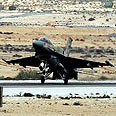
Turkey, a secular country ruled by an Islamic-oriented party, had long been Israel's best friend in the Muslim world. But ties have cooled sharply over Turkish Prime Minister Recep Tayyip Erdogan's sharp criticism of Israel's winter war in the Gaza Strip.
The Israel Air Force recently concluded its preparations for the drill, but several days ago the Israel Defense Forces was informed that it would not be invited to take part in the exercise this year.
The Israeli military said the drill was delayed indefinitely "because of Turkey's decision to change the composition of the participants and not allow the Israeli air force to take part."
The exercise was to have been the sixth annual maneuver of its kind. The IDF said the exercise was to have also included, US, Italian and NATO forces.
The IAF held wide-scale exercises in the past over the Mediterranean Sea or on Turkish territory, in which it practiced airstrikes and aerial fueling.
An Iranian news agency claimed over the weekend that the Turkish decision was the result of pressure exerted by local media on Erdogan, to prevent the participation of the Israeli Air Force. The Turkish media protested the fact that planes which took part in Operation Cast Lead in the Gaza Strip would fly over Turkey.
Amit Zarouk, a spokesman for the Israeli Embassy in Ankara confirmed that the drill had been canceled. He said it was unclear whether the cancellation would be a one-time thing or would continue in the coming years as well.
Other defense officials say Turkey canceled the maneuver after the US said it wouldn't take part if Israel was excluded. They spoke on condition of anonymity because they weren't authorized to discuss the matter with the media.
Tense relations
Israel and Turkey have wide-ranging military, economic and strategic ties, and last year Ankara hosted months of indirect talks between Israel and Syria after an eight-year breakdown.
But Erdogan's criticism of Israel's Gaza war thrust Turkey into the role of championing Gaza's Iranian-backed Hamas rulers, a militant group shunned by Israel and the West. Tensions peaked when the Turkish leader stormed out of a high-profile conference where he confronted Israel's president over steep Palestinian civilian casualties.
Palestinian officials and human rights groups say more than 900 civilians died in the offensive, which was launched to halt years of rocket fire from Gaza on southern Israel. Israel disputes that number but has provided no evidence to back up that claim.
Turkish-Israeli ties have been tested in the past by earlier Israeli attacks on Palestinians but strong security interests helped to mend fences.
Turkey and Israel grew close in the mid-1990s, their alliance based on mutual fears of Iran and Syria. Israel has supplied hundreds of millions of dollars of military hardware to Turkey over the years, the two countries conduct joint naval exercises and the Israeli air force trains over Turkish airspace.
But since Erdogan's government came to power in 2003, Turkey's ties with Iran and Hamas have warmed. Turkey believes the Islamic militant Hamas, which rules the Gaza Strip, must play a key role in the Palestinian territories.















